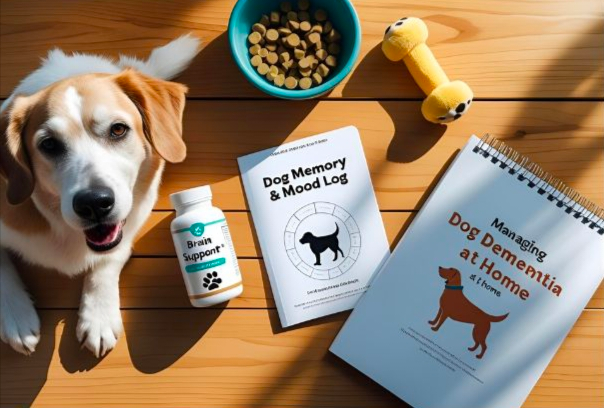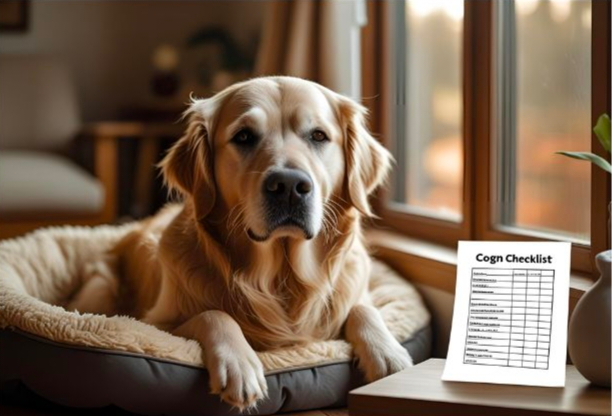Introduction
As our beloved dogs grow older, their bodies naturally slow down. But what many dog owners don’t realize is that their brains can age too. If your senior dog seems confused, forgets routines, or acts differently, it might be more than just old age—it could be Cognitive Dysfunction Syndrome (CDS), often referred to as dog dementia.
Don’t worry—there are ways to help. This blog will explain what cognitive dysfunction is, how to spot the signs early, and practical steps to make life better for your aging pup.
Table of Contents
What is Cognitive Dysfunction in Senior Dogs?
Cognitive dysfunction in Senior dogs is similar to dementia or Alzheimer’s disease in humans. It’s a brain condition that affects older dogs, making them confused, forgetful, and less responsive to everyday things they once knew.
It’s common, too. Studies show that more than 50% of dogs over age 11 show signs of cognitive decline. The older the dog, the higher the chance. But with the right care, you can slow down the symptoms and improve their quality of life.
Common Signs of Cognitive Dysfunction in Senior Dogs
Knowing what to look for is the first step. Here are the top 7 signs to watch out for:
1. Disorientation
Your dog may seem lost in their own home. They might:
- Get stuck in corners
- Stare at walls or into space
- Wander aimlessly
- Struggle to find their food or bed
2. Changes in Social Behavior
- Your once-friendly dog may seem withdrawn
- They may avoid cuddles or playtime
- Some dogs become clingy, while others get irritable or anxious
3. Sleep Pattern Changes
- Restless at night, pacing or whining
- Sleeping all day but up at night (like a “doggy jet lag”)
- Barking for no reason during sleep hours
4. Potty Accidents
Even well-trained dogs may:
- Forget where the door is
- Have accidents in the house
- Stand at the wrong side of the door
5. Reduced Activity and Curiosity
- Stops playing with toys
- Shows no interest in walks
- Doesn’t respond to name or commands
6. Increased Anxiety
- Pacing, whining, or barking more
- Doesn’t want to be alone
- Startles easily or seems nervous
7. Changes in Appetite or Thirst
- Eats less (or sometimes more)
- Drinks less or forgets where water is
- Misses meals because of confusion
How Is Canine Cognitive Dysfunction Diagnosed?

- Arthritis
- Blindness or deafness
- Kidney problems
- Brain tumors or infections
There’s no single test for CCD. A vet will look at symptoms, behavior history, and rule out other issues like:
Sometimes blood tests or even brain scans (MRI) are used.
What You Can Do to Help a Dog With Cognitive Dysfunction
There’s no cure for CCD, but you can help your dog live better. Here’s how:
1. Stick to a Daily Routine
Dogs love structure. A predictable schedule reduces stress and confusion.
- Feed at the same times
- Go on walks at the same hours
- Don’t move furniture around
- Keep their bowls, bed, and toys in the same spots
2. Mental Stimulation
Just like puzzles help older people, keeping your dog’s brain busy can slow down cognitive decline.
- Use food puzzle toys
- Teach them easy new tricks
- Let them sniff and explore on walks
- Play hide-and-seek with treats
3. Healthy Diet and Supplements
Talk to your vet about switching to a senior dog food rich in:
- Omega-3 fatty acids (like fish oil)
- Antioxidants (vitamin E, C)
- B vitamins and CoQ10
Special dog foods like Purina Bright Mind or Hill’s b/d are made to support brain health.
Supplements that may help:
- SAMe (S-Adenosylmethionine)
- Selegiline (Anipryl) — a vet-prescribed medication
- Melatonin — helps with sleep
- CBD oil (vet-approved) — may reduce anxiety and restlessness
4. Create a Safe, Calm Home Environment
- Use nightlights for nighttime wandering
- Block off stairs or unsafe areas
- Add non-slip rugs to help with walking
- Avoid loud noises or crowded spaces
5. Encourage Gentle Exercise
Even short daily walks can:
- Improve circulation to the brain
- Help your dog sleep better
- Prevent muscle loss
Don’t force them to walk too far—keep it slow and pleasant.
6. Use Calming Tools
For anxious or restless dogs:
- Try calming music (like “Through a Dog’s Ear”)
- Use pheromone diffusers (like Adaptil)
- Massage and touch therapy
7. Talk to Your Vet Regularly
As your dog’s needs change, regular vet checkups are key. Your vet may adjust medications, diet, or recommend blood work to rule out other conditions.
Can You Prevent Cognitive Dysfunction in Dogs?
While it can’t always be prevented, there are ways to reduce the risk:
- Start brain games and enrichment early (before age 7)
- Feed a healthy diet rich in brain nutrients
- Exercise daily—even a short walk helps!
- Keep up with vet visits and dental care
- Avoid stressful changes (like moving or rehoming)
End-of-Life Care for Dogs with Advanced CCD

As CCD progresses, some dogs may lose most of their memory or awareness. When quality of life declines significantly, your vet can help you make the kindest decision for your dog.
Look for signs like:
- No longer recognizing family
- Frequent accidents
- Extreme anxiety or fear
- Inability to sleep or eat
It’s never an easy choice, but you don’t have to face it alone. There are support groups and grief counselors for pet parents going through this.
🧠 How Cognitive Dysfunction Affects Your Dog’s Brain
Cognitive dysfunction isn’t just “old age.” It’s caused by degeneration in the brain—including neuron loss, plaque buildup, and reduced dopamine levels. This can impact:
- Memory (e.g., forgetting commands or routines)
- Learning ability
- Awareness of environment
- Social interaction
Think of it as your dog’s internal “GPS” and “memory bank” slowly shutting down. The earlier you spot changes, the better you can manage it.
📊 Dog Dementia vs. Normal Aging: What’s the Difference?
Not all forgetfulness means dementia. Here’s a quick comparison:
| Normal Aging | Cognitive Dysfunction (CCD) |
|---|---|
| Slower to get up | Gets stuck in corners |
| Sleeps more | Awake at night, restless |
| Slower to respond | Doesn’t recognize people |
| Mild hearing loss | Ignores known commands |
| Occasional confusion | Constant disorientation |
Tip: Use a CCD checklist or app to track symptoms weekly (some vets provide them!).
🔁 Stages of Cognitive Dysfunction in Dogs
CCD usually progresses in 3 stages:
1. Mild (Early Stage)
- Slight disorientation
- Some changes in sleep
- Mild house soiling
✅ Best time to start supplements
2. Moderate
- Noticeable confusion
- Frequent nighttime restlessness
- Increased anxiety
⚠️ Requires more structure, calming aids
3. Severe
- Doesn’t recognize family
- Can’t follow routines
- High stress levels or fear
🩺 May need hospice-style care
🛠️ Environmental Modifications to Help Dogs with Dementia
Make small changes to reduce stress and keep your dog safe:
- Baby gates to block stairs
- Rubber mats to prevent slipping
- Nightlights for nighttime wandering
- Scent markers near food/water
- Orthopedic beds for comfort
- Keep feeding & walking areas quiet
🧪 New Research & Treatments for Canine Cognitive Dysfunction

The science behind CCD Privacy Policyis evolving. Promising areas include:
- Senilife® and Novifit® – vet-approved brain health supplements
- TMS (Transcranial Magnetic Stimulation) – under study for dogs
- Nutraceuticals – antioxidant-rich diets for memory support
- CBD research – early signs show anxiety reduction in CCD dogs
Talk to your vet about new clinical trials or emerging treatments in your area.
❤️ How to Emotionally Support a Dog With Cognitive Dysfunction
Dogs with CCD need more love, not less. Here’s how to help them feel secure:
- Speak calmly and clearly
- Maintain eye contact
- Use their name often
- Pet them slowly and gently
- Be patient—they’re not being “bad,” they’re confused
Even small gestures like hand-feeding or lying next to them can bring them comfort.
📱 Tools and Apps for Monitoring Cognitive Health
Use modern tools to track symptoms:
- Doge Dementia Diary (PDF/Printable)
- Pawtrackers
- Vet-approved mobile apps for logging behavior
Tracking trends over weeks or months helps you and your vet spot progression.
📋 Free Resource: Cognitive Dysfunction Symptom Tracker
💾 Download your free weekly CCD symptom tracker
✅ Track mood, memory, behavior, sleep
✅ Share with your vet
✅ Helps identify changes early
(Optional: I can generate a downloadable PDF if you need it)
Also read this
👉 “What to Expect as Your Dog Ages: A Senior Dog Care Guide”
👉 “10 Early Signs Your Senior Dog Might Be in Pain”
👉 “Common Health Problems in Senior Dogs and What to Watch For”
👉 “Best Supplements for Senior Dogs: Brain, Joints & More”
Reference :-
American Kennel Club (AKC) – Canine Cognitive Dysfunction
Cornell University College of Veterinary Medicine – Dog Dementia
Final Thoughts
Cognitive dysfunction in senior dogs is heartbreaking to witness, but there’s still hope. With early recognition and loving care, you can give your dog more comfort, joy, and peace in their golden years.
Stay patient, stay consistent, and keep showing your dog the love they’ve always given you.










